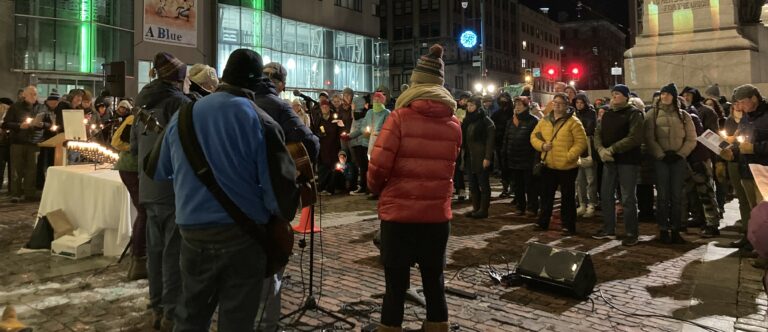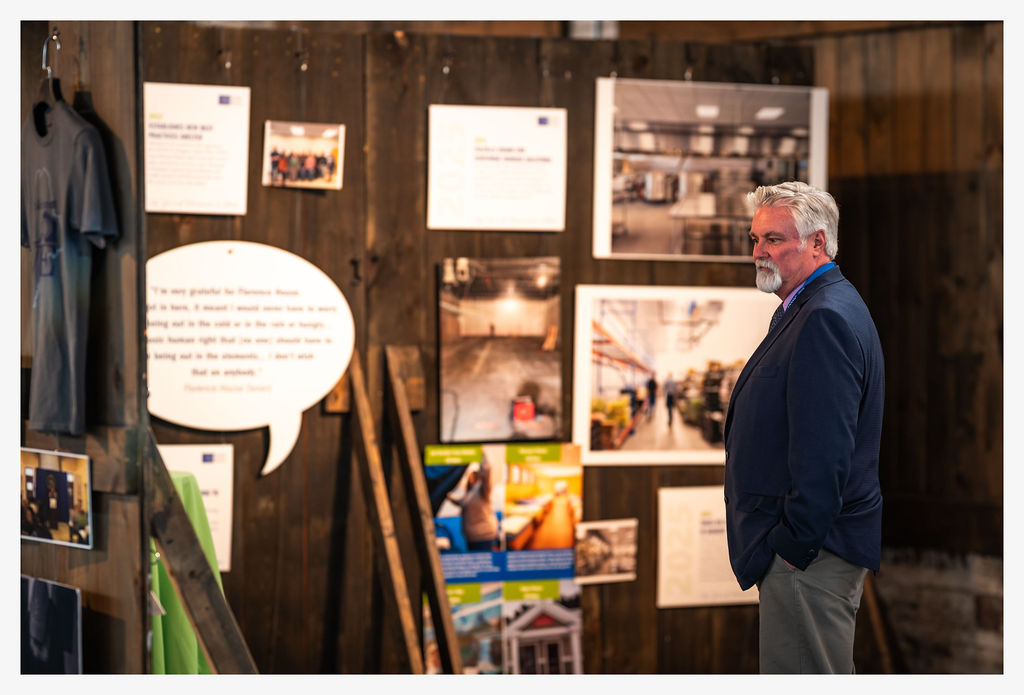Mark Swann’s remarks from the Preble Street 50th Anniversary Celebration
Thank you to every single person who is here tonight. I am so blown away by seeing how many of you came out tonight to help us celebrate 50 years.
I am really proud of all of the work that we’ve done at Preble Street. You should all be proud of this work because we could not do this work without all of you: staff, volunteers, the Board, partners, community members, people who are doing food drives or donating critical funding; people from all across the state. Tonight, we are all in this room, all of us with shared values, all of us who believe that every single human being deserves dignity, shelter, and food. And justice.
I couldn’t be happier that we have this excuse to come together, to celebrate the positive, and be in community together.
For years, I’ve believed that one of the strengths of Preble Street is that we’re good at solving problems. That’s what our social workers do every day, as they work tirelessly to find an apartment for someone despite ever-increasing rents. Or work to help a young person at our Teen Center to find a job. Or untangle a myriad of bureaucracies to secure a nursing home bed for an aging tenant at one of our Housing First apartments.
The same type of skills, the same way of thinking, is also true beyond our direct service work. When it comes to trying to open a new program, for example, or navigate a bill through the legislative process, we need those same problem-solving skills. It’s in our DNA, I think.
This was brought home to me in a big way when the pandemic hit: Open a 50-bed shelter in 5 days? Open a quarantine shelter? Run a big shelter in Lewiston? Open pop-up vaccination clinics? Expand our statewide Veterans’ program? Start a brand new Street Outreach Team, and a Rapid Re-Housing program? We did all that and more.
We doubled in size as an agency in 9 months, as we partnered over and over again with the state, trying to keep our clients and our community safe and healthy.
We are really good at solving problems.
But when I stop to think about it, social work is not about solving problems, really. It’s about seeing the possibilities. Our caseworkers don’t solve problems for our clients. We work alongside our clients. We listen to them. We learn their names, no small thing for people who are too often invisible to the rest of the world.
And as we get to know them, we start to see possibilities. Possibilities and potential in them as human beings. Possibilities for their future, whether that’s the immediate future, like making sure they can secure a bed in Maine’s overcrowded shelter system, or longer term, like helping a young client get into SMCC to study culinary arts. There are possibilities and potential in everyone.
Watch Mark Swann’s full remarks here.
Recently, I was at an event at a local radio station and met one of their employees who wanted to thank me in person for all the help and support he got from Preble Street 15 years ago when he was “having a tough time”, when he was trying to survive on the street. He shared with me that he’ll never forget how kindly and respectfully he was treated, how every staff person he met looked him in the eye, and how he felt valued during a time in his life when he felt unwanted by the world.
We don’t always get to know all of the times that we make a difference, but we do know that continuing to show up every day and showing thoughtful compassion and care will make a difference in ways we may never know.
And we take the same approach when unexpected events happen in the community, in our state. For example, when the Hope House Shelter in Bangor was going to close last year, we were able to keep it open because we saw possible avenues to save it. Not certainties. And not magical thinking either, pie-in-the-sky pathways that rarely pan out. But true possibilities and ideas that we worked through, asking others for advice and support, building alliances and buy-in, and developing a real plan to solve a very complex set of problems. Promising only that we’ll work very, very hard.
And we did it. Starting in February, just a few months ago, we took on the responsibility of running the now Preble Street Hope House Shelter in Bangor. The second largest shelter in Maine, in the third largest city in Maine, is open and is making sure that each night, 56 people are safe, warm, and cared for by professional staff.
Our 50-year history is filled with story after story like this. It starts with seeking out possibilities. That’s what keeps us going. And that is critical to our success as an agency and our place in this world.
And we’re not going to let an authoritarian regime in Washington take that away from us.
That regime may try to intimidate and scare us. They may take more funding from us just because we have the audacity to feed people who are unhoused, shelter asylum seekers, love trans people, and care for survivors of human trafficking.
We are not going to stop believing in possibilities, believing in potential, believing in hope. And what might be.
Every individual in this room, every person in our shelters or apartments, and every human trying to survive outside has possibilities and potential. That’s what has kept Preble Street going for 50 years, and what will keep us going for many more. Each conversation comes with a little bit of hope. Every meal is served with a side of potential. Each key turning in the door of someone’s new apartment opens a room full of possibilities.
So tonight, I want you all to take some potential, hope, and possibility with you when you leave. Spread it around. I promise, the more of it you give, the more of it there is.
You might’ve heard a term recently, ‘flood the zone.’ Well, I think it’s time that we flooded the zone. Flood the zone with hope. Flood the zone with kindness and respect for others. Flood the zone with our voices and our advocacy.

Donate
Help support our neighbors experiencing homelessness, hunger, and poverty. 50 for 50 Monthly Partners Get ready to celebrate with us! 2025 marks our incredible 50th year of compassion in action, and we’re planning something extra special to honor this huge milestone. We’re on a mission to find 50 amazing supporters to join us this year

50 years
of Compassion in Action
50 years of helping others! In 2025, Preble Street celebrates 50 years of Compassion in Action; providing a voice for marginalized and underserved populations, advocating for and investing in solutions, and providing people not only with food, clothing, and shelter, but also with dignity. For 50 years, our work has been about making Maine a

Advocacy
ADVOCATING FOR SOLUTIONS Read Preble Street’s Legislative Priorities for the short session of the 132nd Maine legislature here. Preble Street is committed to motivating both the public and private will to end hunger, homelessness, and poverty in the lives of our neighbors and to building strong, equitable, and just communities. Healthy communities depend on dignity,
